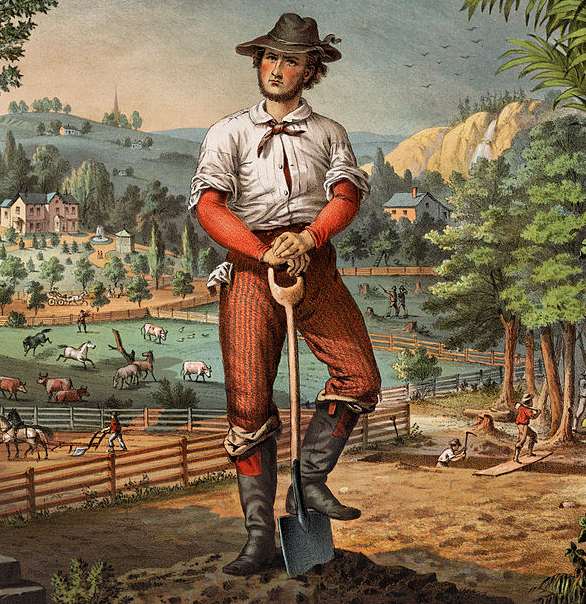History
A Timeline of the Grange.
Founded in 1867, the Grange has a rich history. Learn about the accomplishments of the Grange, and discover some famous members.
They were in the Grange?
At the beginning, membership in the Grange was restricted to farmers and ranchers, and the Grange continues to focus on rural areas today, away from the glamor and renown of larger media markets. However, there are still some famous names that belong, or have belonged to the Grange.
Grange members include Presidents Franklin D. Roosevelt and Harry S. Truman. Henry Groseclose, who founded the Future Farmers of America was a member. Other notable members include Norman Rockwell and Eleanor Roosevelt. Krist Novoselic, best known as a founding member of Nirvana, is a Grange member.
Notable Oregon Grange members include Abigail Scott Dunaway (suffragette), Mark Hatfield (educator and US Senator) and Clara Waldo (first woman named to a Board of Regents, supporter of women’s rights and namesake of Waldo Hall on Oregon State Campus).
1867
Oliver Hudson Kelley, Caroline A. Hall, William M. Ireland, William Saunders, Aaron B. Grosh, John Trimble, Francis Marion McDowell and John R. Thompson found the National Grange of the Order of the Patrons of Husbandry.
1868
Potomac Grange #1 Washington DC Jan 8, Fredonia Grange #1 Fredonia, Chataqua County, New York Apr 16.
1871
Chicago entrepreneur Aaron Montgomery Ward begins his mail order business as a contractor to the National Grange selling exclusively to Grange members.
1873
Oregon State Grange Founded.
1875
Grange membership reaches 860,000 members in 21,000 Granges.
Introduces the “Rochdale Principles” of cooperative business to Americans. This system remains the basis for business co-ops today.
1876
Much of the early Grange political activity was focused on private business practices that adversely impacted farmers, especially the raildroad monopolies. In 1876, The Supreme Court ruled in Munn vs. Illinois that the Granger Laws regulating railroads and other monopolies was in the public interest.
1880s
Lower Columbia Fire Relief Association formed, the first mutual insurance company in Oregon.
1887-1919
Secures passage of legislation to protect the political and economic rights of farmers and consumers including: the Hatch Act creating “Experimental Stations” at state colleges of agriculture (1887), elevation of the U.S. Department of Agriculture to the President’s Cabinet (1889), the Sherman Anti-Trust Act (1890), rural free delivery mail service (1901), the first legislation promoting ethanol as a motor fuel (1906), the Pure Food and Drug Act (1906), direct election of U.S. Senators (1913), federal income tax (1913), Smith-Lever Act for vocational education (1914), the Clayton Anti-Trust Act (1914), and Universal Suffrage (1919)
1890s
Oregon State Grange backs Initiative and Referendum, adopted in 1902.
Grange membership no longer restricted to famers only.
1900s
Advocated amending Oregon’s
Constitution to allow recall of
public officials.
Hosted the National Grange
Convention in Portland; also in
1921, 1938, 1946, 1963, 2002,
and 1985 in Eugene.
1910s
Adopted a resolution in favor
of suffrage for women, which
voters passed that November.
1911-Extension Service founded at OSU. The Grange was influential in lobbying for the establishment of the Extension Service.
Proposed the “Grange bill”
initiative to create the State
Highway Department.
Backed the Workmen’s Com-
pensation Law.
Very influential in establishing
the State Board of Forestry.
1914 and on
Secures passage of successive pieces of legislation to finance general transportation improvements to benefit farming and rural communities based on dedicated user fees deposited in highway, waterways and airport trust funds.
1916-1941
Secures passage of federal legislation to assist struggling farmers by strengthening their property rights and bargaining position including: the Federal Farm Loan Act (1916), the Packers and Stockyards Act (1921), Capper-Volstead Act (1922), the Grain Futures Act (1922), Farm Credit Act (1933), Produce Agency Act (1927), Perishable Agricultural Commodities Act (1930), Agricultural Marketing Agreements act (1937), Pure Seed Act (1939), and the Livestock Theft Act (1941).
1920s
Supported the graduated income
tax.
Exhibited at the Pacific International
Livestock Show and State Fair.
Used the Referendum to have the
people vote on laws enacted by the
State Legislature.
1930s
Initiated a Constitutional Amendment to allow Public Utility Districts.
Backed creation of the State Department of Agriculture.
Lead defeat of the sales tax, the first
of nine times.
1947 and on
Steadfastly supported national farm legislation as well as multilateral trade negotiations and food aid programs to open foreign markets to U.S. farmers. Advised Congress and supported every periodic re-authorization of national farm legislation, known as the “Farm Bill.” Gave counsel and support to every U.S. President on international discussions leading to multilateral trade agreements and international food aid programs such as the General Agreement on Tariffs and Trade, the World Trade Organization, Food for Peace, the Caribbean Basin Initiative, North American Free Trade Agreement, and the Central American Free Trade Agreement.
1950s
Oregon Granges won top awards in the national Community Service contest sponsored by Sears–Roebuck.
Moved a log cabin to the State Fairgrounds for Oregon’s Centennial to show how pioneer farmers lived and worked; it became one of the most popular exhibits.
1963-70
National Grange participates in agriculture development programs for the U.S. Peace Corps.
1964
Oliver H. Kelley Homestead (farm), in Minnesota, designated a National Monument on July 19 for its role in agrarian activism.
1965
National Grange developed the feed grains provisions incorporated in the Food and Agriculture Act of 1965.
1967
Grange Centennial. Grange Motorcade Caravan travels from Washington DC, to Gettysburg, for centennial ceremony, to Syracuse for 101st Centennial Convention. USPS issues centennial 5-cent stamp in honor.
1980-90s
Oregon State Grange adopts resolution to mandate a newborn hearing screening test, which becomes law in 2015.
2019
Oregon Granges pass resolution advocating for improved rural broadband services. National Grange advocates for same, and in January 2022, FCC announces $1.2 billion Rural Digital Opportunity Fund.
2020s
National Grange advocates for postal reform, resulting in HR 3076 in 2021-22 Congress. “The United States Postal Service is a vital service for rural America,” (National Grange President Betsy sic.) Huber said. “In areas lacking access to broadband, the postal service is an essential lifeline. Rural America also depends on the USPS for the delivery of life-saving medicines, bills and checks, ballots, and even time-sensitive farming essentials like baby chicks and other plants.”


